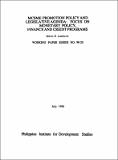| dc.description.abstract | This paper analyzes the impact of monetary policy, finance and credit programs on Micro,
Cottage, Small and Medium Enterprises (MCSME) development in the Philippines. It also examines
corresponding monetary policies, finance and credit programs in Japan, Korea and Taiwan and attempts
to draw for the Philippines some lessons and implications from their experience. Theultimate objective
is to recommend specific policies and legislative actions for the promotion of MCSMEs in the country.
The Philippine monetary and banking policies have gone through several changes. Between the
creation of the Central Bank (1949) and 1985, cheap credit policies had been maintained. Highly
specialized banks were created to serve specific sectors of the economy. The result was that the financial
system was not able generate enough resources and create instruments to meet the rapidly growing
demands of the real sector. Although MCSMEs were specifically targeted by these policies, still they
were left out by the formal credit system. The more repressed the financial system, the more they were
left out. In other words, the subsidy in credit went to those who did not need the subsidy. The myriad
of special credit programs hardly helped the MCSME.
The reforms in 1985 were significant in the sense that instruments for repressing the financial
system were gradually removed. For instance, most subsidized credit programs were either closed or
rationalized. The reason is because small borrowers_ like the MCSMEs, are willing to pay the market
rate of interest provided they are given access to credit. In addition, restrictions on bank entry and
branching are gradually being removed.
Interestingly, however, the government has not only maintained but increased the number of
special credit programs. Most of them charge the market rate of interest and utilize NGOs as conduits
of the funds. This raises some questions. First, the viabilityof these programs could not be immediately
ascertained because subsidies are hidden. For instance, the salaries of the staff managing the programs
are not reflected in any appraisal of the program. Second, these programs are small, fragmented, and
overlapping in function with each other. Understandably, efforts to assist MCSME are also fragmented.
Thus, MCSMEs are left without any support from the government.
Threats of policy reversal have become more pronounced given the number of bills filed in
Congress that recommend the re-institution of subsidized credit policy and ceilings on lending rates.
There are several lessons that can be drawn from the experience of Japan, Korea, and Taiwan
in assisting the development of their MCSMEs. First is appropriate macroeconomic policies. Small
banks were allowed to proliferate in the Japanese landscape. The historically low inflation rate of
Japan was conducive to savings mobilization. This explains why lending to SMEs from special credit
programs comprised only a small proportion of total credit obtained by SMEs. Second, Japan has a
legal framework for the promotion of SMEs. An example is the law that protects subcontractors from
unfair practices of the mother companies. This has contributed to the growth of subcontracting business
in Japan. Third, Japan provides ample technological and marketing support to their SMEs to make
them competitive even in the world market. And finally, Japan created a lead agency to assist the
SMEs. Being a corporation, it has greater flexibility in meeting the changing demands of the SMEs.
Korea basically followed the footsteps of Japan, i.e.,its government is heavily involved in the
promotion of SMEs. The assistance is focused on knowledge-intensive SMEs by providing technology
and venture capital. However, it is encountering some difficulties because in the past, its industrial policies favored the establishment of large industries. Subcontracting in Korea is not as well developed
as that of Japan.
Taiwan sharply differs from the approach pursued by Japan and Korea. In fact, it is only
recently that this country started some programs to assist SMEs. But Taiwan's overall economic policies
had been conducive to the development of $MEs. For instance, Taiwan's rural infrastructure system
is far superior to that of Korea. Thus, SMEs in the rural sector were able to operate viably.
No matter how monetary policy is made conducive to the development of MCSMEs, it cannot
work independently of the rest of macroeconomic policies. The first task therefore is to fmetune
macroeconomic policies so that their biases against MCSME willbe reduced, if not totally eliminated.
As regards monetary policy, a fighter control on the movements of monetary aggregates is desirable to
achieve a stable movement of the general price level.
There is a need to create a body which will promote the cause of the MCSME. Its task will
be to concretize policies and not to formulate them. A corporation similar to Japan Small Business
Corporation is suggested. It may set up its own research and training institutes or incorporate in it
existing research and training institutes. It will be funded by integrating the existing lending programs
for MCSMEs including the six major lending programs of Technology and Livelihood Resource Center
(TLRC). | en_GB |


